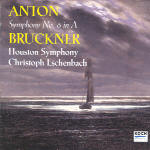During the past few years Christoph Eschenbach has slowly built a reputation that marks him as one of today’s best conductors. Because he hasn’t enjoyed the support of a major label, it may be some time before his abilities receive the recognition that they deserve, but he’s clearly an artist with interesting musical ideas and the ability to communicate them to an orchestra. This Bruckner Sixth offers eloquent testimony to his talent. First, listen to the sonority he draws from the Houston Symphony: rich, dark, built from the basses up, the brass never blasting or covering the strings, and nicely differentiated between instrumental groups. This is, in short, a true “German” sound, more so in fact than you’ll hear at the Berlin Philharmonic these days, now that they’ve hired Simon Rattle and decided to become (in the words of a colleague) “the world’s greatest Walton orchestra.”
Eschenbach’s interpretation of this marvelous symphony also rewards the closest attention. Aside from a wonderfully grave, intense Adagio, it’s not especially slow, and yet never sounds hurried or pushed. Tempos move with natural aptness. Eschenbach’s transitions between sections, as well as his moments of interpretive “point making”, are always well timed and, even when fairly extreme, convincingly carried off. Passages such as the first movement coda possess a serene majesty that once heard reveal exactly what Bruckner must have intended. Eschenbach’s handling of the finale’s second subject is especially noteworthy. Although this music is often derided, even by Bruckner specialists (such as Tintner and Jochum), Eschenbach demonstrates that it has its own points to make when given room to breathe. He perfectly conveys the sense of something mysterious or sacred breaking through the superficially trivial surface, surely the correct vision of a composer who saw the hand of God at work in the simplest aspects of daily life.
The fact that all of this takes place in the context of live concerts, with their limited opportunities for corrections and patches, only serves to highlight the quality of Eschenbach’s achievement in Houston. Fortunately, the recording is technically excellent. This is a major statement by a significant artist whose importance, it seems to me, will only (and deservedly) grow over time. [12/19/2000]
































